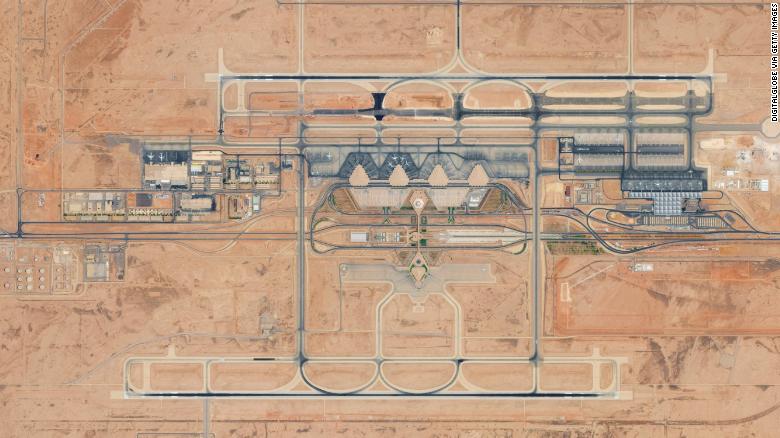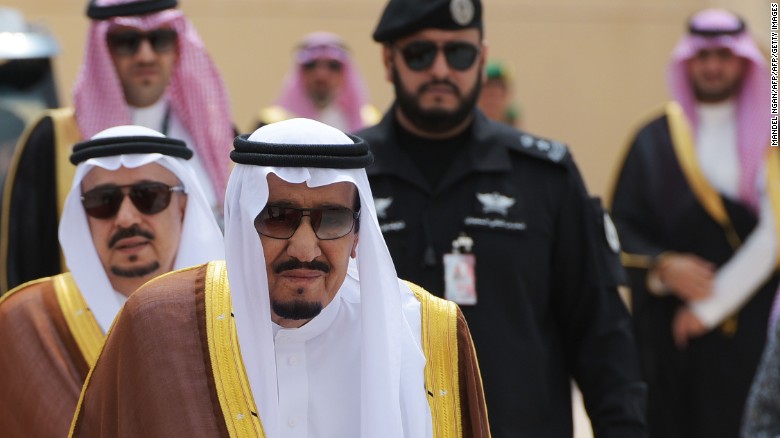The meeting came on the heels of a series of tweets in which Sabhan chastised the Lebanese government for its inclusion of Hezbollah. Hariri appeared to have defused tensions with his visit.
Lebanese MP Yassin Jaber, a member of a pro-Hezbollah parliamentary bloc, told CNN that he met with Hariri just as he returned from Saudi Arabia, and described the premier as cheery and in a "joking" mood.
But when Hariri returned to Saudi Arabia the second time, it was an altogether different matter.
It would be the first time a Lebanese premier submitted his resignation from outside the country. Multiple local media reported that nearly all Hariri's closest aides were caught unawares.
"Over the past decades, Hezbollah has unfortunately managed to impose a fait accompli in Lebanon by the force of its weapons, which it alleges is a resistance weapon," Hariri said in his resignation speech.
"I want to tell Iran and its followers that they are losing their interferences in the Arab nation affairs. Our nation will rise just as it did before and the hands that want to harm it will be cut," he said in remarks apparently aimed at Hezbollah, which he shared a coalition government with.
Hariri's resignation spells the collapse of a 30-member government of national unity that saw Saudi-backed Hariri fill the post of prime minister, and Hezbollah-backed Michel Aoun occupy the presidency. That government, analysts say, was one of the byproducts of the Obama administration's landmark Iran nuclear deal.
"With this arrangement, we saw some sort of appeasement where we saw mutual steps from the US and Iran in improving relations and lowering tensions in various areas," said Riad Kahwaji, director of Institute for Near East and Gulf Military.
The period marked a brief time of stability, in which Lebanon seemed to have steered clear of regional fault-lines.
"With (Hariri's) resignation yesterday, this arrangement has come to an end and we are back to an escalation between Iran and Saudi Arabia on the Lebanese front. Lebanon is back in the arena of the showdown between Iran and Saudi Arabia.
"Everyone in Lebanon is holding tight and worried ... we're seeing now that we may again be engulfed in conflict," said Jaber.
Riyadh intercepts ballistic missiles
Hariri's resignation triggered a crescendo of war drums. Israeli Prime Minister Benjamin Netanyahu said the remarks were a "wake-up call" to "take action" against Iran. Saudi Minister Sabhan promptly tweeted: "The hands of treachery and aggression must be cut off," echoing Hariri's threats against Hezbollah.
Just hours later, Yemen's Houthi rebels launched a ballistic missile targeting King Khalid International Airport in the Saudi capital. Saudi forces intercepted the missile over northeast Riyadh, the Saudi Ministry of Defense said, but the Houthis hailed it as a "success" that "shook the Saudi capital."
The attack was conducted using a Yemeni-made, long-range missile called the Burqan 2H, the rebels said. The missile launch was the first time the heart of the Saudi capital has been attacked.
The Saudi-led coalition accused a regional state of providing material support to the Houthi rebels, saying the firing of a ballistic missile at Riyadh "threatens the security of the Kingdom and regional and international security," according to a statement carried by Saudi state-TV al-Ekbariya.
The coalition didn't name the country. Saudi Arabia has been fighting a proxy war in Yemen against Iran, which it accuses of arming the Houthi rebels.
Analysts dubbed this a "major escalation" in the Yemeni war.
"This is a major escalation and will have tremendous implications on the situation in Yemen itself, because Saudi Arabia now feels extremely the urge to retaliate against the Houthi movement that controls the government in Sanaa," said Gerges.
Gerges added that combined with the political rupture in Lebanon, the ballistic missile attack spells an outbreak of tensions "throughout the region."
Saudi Arabia wages war within and without
Saudi Arabia was still putting out the fires caused by the missile attack when state TV announced the onset of an anti-corruption crackdown led by the crown prince. Over 17 princes and top officials were arrested on graft charges, according to a list obtained by CNN and cited by a senior royal court official.
The list includes billionaire business magnate Prince Alwaleed bin Talal, who owns 95% of Kingdom Holding, which holds stakes in global companies such as Citigroup, Twitter, Apple and News Corp.
The list also includes formal head of the royal court Khaled Al-Tuwaijri, Saudi media mogul Waleed Al-Ibrahim and Prince Turki Bin Nasser.
"Some of the wealthiest figures in the Arab world are in apprehension today," said military analyst Riad Kahwaji.
"This is unprecedented. We're seeing it for the first time and it's definitely causing shockwaves across the region."
Reportedly, the detainees are being held at the lavish Ritz-Carlton hotel. "I think there's a lovely irony in that many of these corrupt deals happened at the Ritz-Carlton and now these guys are locked up there," said historian Robert Lacey, who wrote two books about the kingdom.
"In historic terms, what we've seen in the last few months is nothing short of revolutionary," said Lacey. "I've been waiting for 40 years for these things to happen, and they happened in four months."
Mohammed bin Salman's campaign of "two fronts," as analysts have dubbed it, is being met by cheers and apprehension. But there is near consensus that these are uncharted waters, and the results will be dramatic.

















No comments:
Post a Comment
thanks 4 comment we gun look at it soon